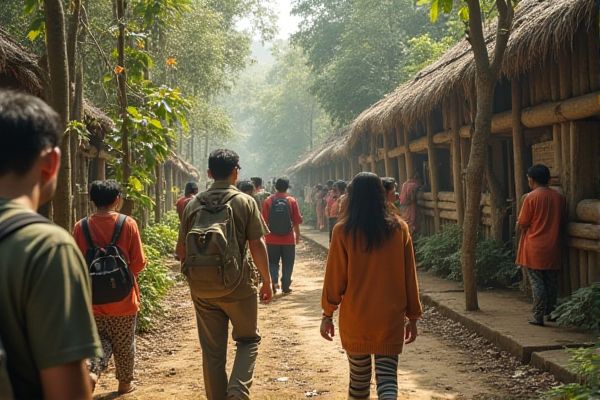
Bangladesh offers a range of anthropology job opportunities across various sectors, including academia, research organizations, non-profit agencies, and governmental bodies. Universities often seek anthropology graduates for teaching and research roles, focusing on cultural, social, and physical anthropology. Non-governmental organizations (NGOs) require anthropologists for community development, cultural preservation, and social research projects aimed at improving the lives of marginalized populations. Additionally, positions in heritage management and museum curation are available for individuals interested in preserving and interpreting Bangladesh's rich cultural history.
Job Description
Anthropology jobs in Bangladesh often revolve around cultural research, social development, and community engagement. Professionals in this field may work with non-governmental organizations (NGOs), government agencies, or academic institutions to study the rich diversity of Bangladesh's cultures and traditions. Tasks typically include conducting field research, analyzing social patterns, and developing programs that promote sustainable development. A strong understanding of local customs and languages can enhance your effectiveness in these roles, making a significant impact on societal issues.
Requirement
Anthropology jobs in Bangladesh typically require a strong educational background, often necessitating at least a master's degree in anthropology or a related field. Familiarity with local cultures, languages, and socio-political contexts is essential for effective engagement with communities. Employers often look for skills in research methodology, data analysis, and the ability to communicate findings clearly. Practical experience through internships or fieldwork can significantly enhance your employability in this sector.
Salary and Perks Expected
Anthropology jobs in Bangladesh offer competitive salaries that can vary significantly based on experience and the specific role within the field. Entry-level positions typically start at around BDT 20,000 to 30,000 per month, while more experienced professionals can earn upwards of BDT 50,000 or more. In addition to salary, many organizations provide perks such as health insurance, travel allowances, and opportunities for research funding. As the field is evolving in Bangladesh, pursuing a career in anthropology can lead to fulfilling roles in academia, non-profits, and government sectors.
Similar Job Names
- Cultural Anthropologist
- Archaeologist
- Social Anthropologist
- Ethnographer
- Museum Curator
- Academic Researcher
- Anthropological Consultant
- International Development Specialist
- Policy Analyst
- Cultural Resource Manager
- Environmental Anthropologist
- Field Research Assistant
- Community Development Officer
- Anthropological Trainer
- Heritage Conservation Specialist
Job Expectation Concept
In Bangladesh, anthropology jobs often involve research and analysis related to cultural practices, social structures, and community dynamics. Professionals in this field engage with local communities to gather data, providing insights that can inform policy and development initiatives. Opportunities exist in various sectors, including academic institutions, non-governmental organizations, and government agencies, focusing on issues such as health, education, and human rights. Understanding the unique cultural and social landscape of Bangladesh is essential for successfully navigating these roles and making a meaningful impact in the community.
Career Advantage and Weakness
Anthropology jobs in Bangladesh offer unique career advantages, such as a deep understanding of social dynamics and cultural practices, which can be invaluable in various sectors, including education and non-profit organizations. You can expect opportunities in research and community development, allowing for meaningful contributions to society while enhancing your professional skill set. The demand for anthropologists may be limited, presenting a potential weakness in job availability and competition in certain areas. Networking and specialized training can help mitigate these challenges, enabling you to carve out a successful career path in this field.
Important Thing Must Know
Anthropology jobs in Bangladesh offer diverse opportunities for individuals interested in cultural studies, social development, and research. Organizations such as non-profits, government agencies, and academic institutions actively seek anthropologists to address local and national issues. Your skills can contribute to projects focusing on community development, public health, and education, which are crucial in improving living standards. Networking with professionals in the field, attending conferences, and engaging in community outreach can enhance your prospects. Understanding the cultural nuances and challenges specific to Bangladesh is vital for success in this field.
Alternative Career Options
In Bangladesh, anthropology graduates can explore various alternative career options beyond traditional roles in academia or research. Opportunities in cultural heritage management allow you to work with museums, archives, and historical sites, preserving and promoting the nation's rich cultural landscape. Non-governmental organizations (NGOs) often seek anthropologists for community development, where your skills in understanding social dynamics can lead to impactful programs. Additionally, the tourism industry values expertise in cultural anthropology to enhance visitor experiences and support sustainable practices in local communities.
Companies List
- BRAC
- Grameen Bank
- Save the Children
- WorldFish
- Asian University for Women
- International Centre for Diarrhoeal Disease Research, Bangladesh (ICDDR,B)
- United Nations Development Programme (UNDP)
- GIZ Bangladesh
- The Asia Foundation
- CARE Bangladesh
List of Ideal City
Dhaka, the capital of Bangladesh, offers a vibrant job market for anthropologists, with numerous NGOs and research institutions focused on social issues and cultural heritage. Chittagong, as a major port city, presents opportunities in maritime anthropology and studies related to trade and migration. Sylhet, known for its rich cultural diversity, provides unique avenues for anthropological research, particularly in diaspora studies and cultural expressions. Khulna, with its proximity to the Sundarbans, allows for exploration in environmental anthropology and the impacts of climate change on local communities.
 jobs-bangladesh.com
jobs-bangladesh.com